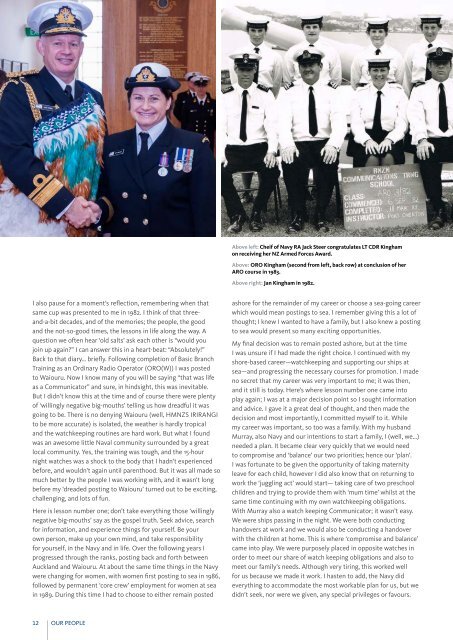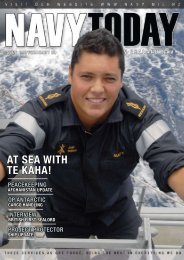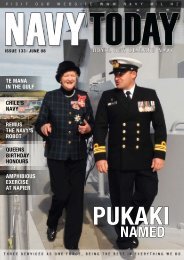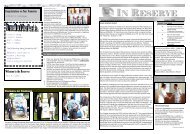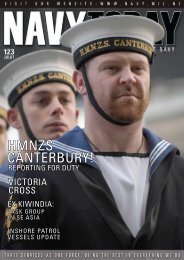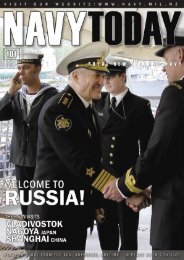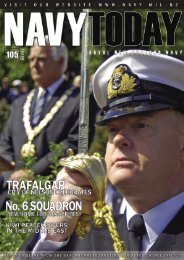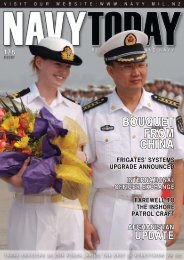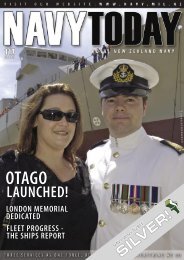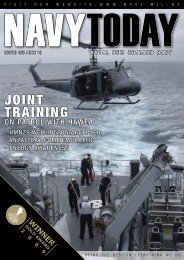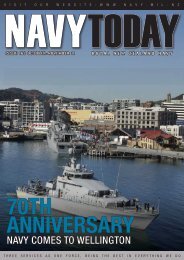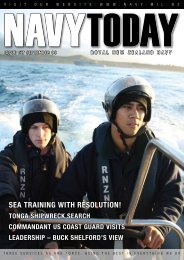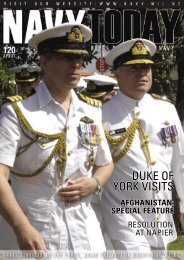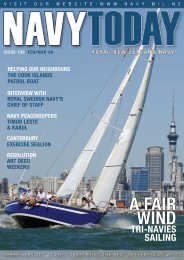Aug-Sep 2013, Issue 174 - Royal New Zealand Navy
Aug-Sep 2013, Issue 174 - Royal New Zealand Navy
Aug-Sep 2013, Issue 174 - Royal New Zealand Navy
Create successful ePaper yourself
Turn your PDF publications into a flip-book with our unique Google optimized e-Paper software.
Above left: Cheif of <strong>Navy</strong> RA Jack Steer congratulates LT CDR Kinghamon receiving her NZ Armed Forces Award.Above: ORO Kingham (second from left, back row) at conclusion of herARO course in 1983.Above right: Jan Kingham in 1982.I also pause for a moment’s reflection, remembering when thatsame cup was presented to me in 1982. I think of that threeand-a-bitdecades, and of the memories; the people, the goodand the not-so-good times, the lessons in life along the way. Aquestion we often hear ‘old salts’ ask each other is “would youjoin up again?” I can answer this in a heart-beat: “Absolutely!”Back to that diary… briefly. Following completion of Basic BranchTraining as an Ordinary Radio Operator (ORO(W)) I was postedto Waiouru. Now I know many of you will be saying “that was lifeas a Communicator” and sure, in hindsight, this was inevitable.But I didn’t know this at the time and of course there were plentyof ‘willingly negative big-mouths’ telling us how dreadful it wasgoing to be. There is no denying Waiouru (well, HMNZS IRIRANGIto be more accurate) is isolated, the weather is hardly tropicaland the watchkeeping routines are hard work. But what I foundwas an awesome little Naval community surrounded by a greatlocal community. Yes, the training was tough, and the 15-hournight watches was a shock to the body that I hadn’t experiencedbefore, and wouldn’t again until parenthood. But it was all made somuch better by the people I was working with, and it wasn’t longbefore my ‘dreaded posting to Waiouru’ turned out to be exciting,challenging, and lots of fun.Here is lesson number one; don’t take everything those ‘willinglynegative big-mouths’ say as the gospel truth. Seek advice, searchfor information, and experience things for yourself. Be yourown person, make up your own mind, and take responsibilityfor yourself, in the <strong>Navy</strong> and in life. Over the following years Iprogressed through the ranks, posting back and forth betweenAuckland and Waiouru. At about the same time things in the <strong>Navy</strong>were changing for women, with women first posting to sea in 1986,followed by permanent ‘core crew’ employment for women at seain 1989. During this time I had to choose to either remain postedashore for the remainder of my career or choose a sea-going careerwhich would mean postings to sea. I remember giving this a lot ofthought; I knew I wanted to have a family, but I also knew a postingto sea would present so many exciting opportunities.My final decision was to remain posted ashore, but at the timeI was unsure if I had made the right choice. I continued with myshore-based career—watchkeeping and supporting our ships atsea—and progressing the necessary courses for promotion. I madeno secret that my career was very important to me; it was then,and it still is today. Here’s where lesson number one came intoplay again; I was at a major decision point so I sought informationand advice. I gave it a great deal of thought, and then made thedecision and most importantly, I committed myself to it. Whilemy career was important, so too was a family. With my husbandMurray, also <strong>Navy</strong> and our intentions to start a family, I (well, we…)needed a plan. It became clear very quickly that we would needto compromise and ‘balance’ our two priorities; hence our ‘plan’.I was fortunate to be given the opportunity of taking maternityleave for each child, however I did also know that on returning towork the ‘juggling act’ would start— taking care of two preschoolchildren and trying to provide them with ‘mum time’ whilst at thesame time continuing with my own watchkeeping obligations.With Murray also a watch keeping Communicator; it wasn’t easy.We were ships passing in the night. We were both conductinghandovers at work and we would also be conducting a handoverwith the children at home. This is where ‘compromise and balance’came into play. We were purposely placed in opposite watches inorder to meet our share of watch keeping obligations and also tomeet our family’s needs. Although very tiring, this worked wellfor us because we made it work. I hasten to add, the <strong>Navy</strong> dideverything to accommodate the most workable plan for us, but wedidn’t seek, nor were we given, any special privileges or favours.12 OUR PEOPLE


